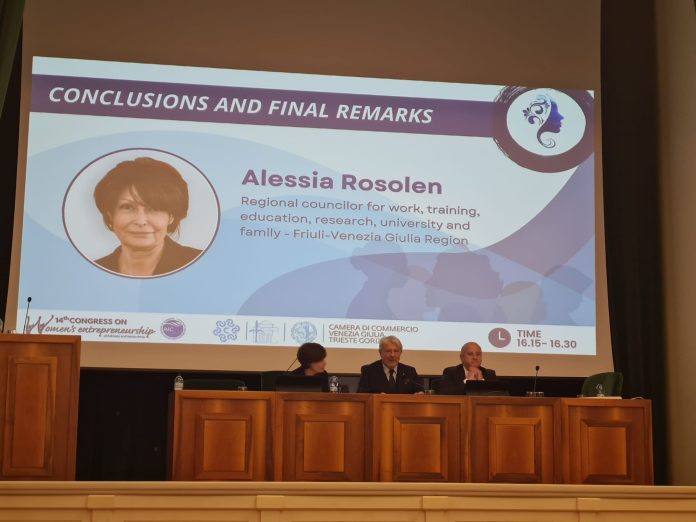
by InTrieste
At the 14th Adriatic-Ionian Congress in Gorizia this week, Alessia Rosolen, Friuli Venezia Giulia’s Regional Councillor for Labor, Training, University, and Research, delivered a compelling address on the importance of cultural investment, regional cooperation, and women’s entrepreneurship across Southern Europe. Before a diverse audience of over sixty businesswomen from Italy, Slovenia, Croatia, Albania, and other Adriatic-Ionian countries, Rosolen outlined regional initiatives aimed at empowering women in business through sustainable growth strategies in the face of rapid technological change.
“Cultural and creative sectors are among the most significant areas of investment for the Region,” Rosolen said at the closing session in Palazzo de Bassa. “Through a dedicated public-private cluster, we’re not only fueling these industries but integrating them with programs focused on hospitality and tourism.” These sectors, she explained, are critical to Friuli Venezia Giulia’s economy, where they are also supported by government-backed initiatives tailored for women entrepreneurs.
Highlighting the importance of education, Rosolen praised Gorizia’s specialized programs, such as the DAMS (the Discipline of Arts, Music, and Performing Arts) and Public Relations programs, which have made the city, according to her, “fertile ground for new ideas and opportunities.” Gorizia is part of a larger regional framework encouraging innovation, she noted, referencing the recent Big Science Business Forum in Trieste, a high-profile exhibition showcasing technologies at the forefront of scientific research.
Rosolen’s remarks were as much forward-looking as they were grounded in the region’s strengths, advocating for an intersectional approach to development where “the economy always goes hand-in-hand with culture.” She emphasized that the Adriatic-Ionian area stands uniquely positioned to be a model for regional and international cooperation, driven by mutual respect and shared ambitions.
The Congress, organized by the Venezia Giulia Chamber of Commerce, exemplified how, amid the tectonic shifts brought by technological advancements, local governments and regional councils are adapting with unprecedented speed. Rosolen pointed to the urgency of remaining competitive in the face of what she termed “the fastest industrial revolution ever.” This era demands, she argued, rapid adaptation to digital and artificial intelligence (AI) advancements, alongside a proactive stance in preparing workers—especially women—for the evolving demands of the modern job market.
“Anticipating the social impacts of these technological changes is crucial,” Rosolen said, underscoring the need for a holistic approach that links technological development with social adaptation. Recognizing the transformative effects of these shifts, she stressed the importance of fostering tech-savvy skills in women entrepreneurs through continuous education and professional development. “This is why we don’t rely on one-off solutions but approach it from a systemic perspective, investing in technical and professional education to support sustainable growth in all sectors.”
For Rosolen and other participants, the Congress underscored an imperative to move beyond rhetoric, focusing instead on concrete actions to address the economic needs of the region’s women.




























